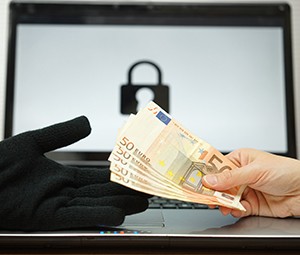 Imagine you’ve just come home after a long day of work to open your computer and find a pop up on your screen instructing you to pay approximately $500 to unlock and decrypt all your files. You’ve just been hit by ransomware, and now you have a choice to make. Do you pay up to get your files back, or do you stand your ground? Ransomware has recently become the hottest attack method for hackers to use, and it effects upwards of 10,000 people in the US each day.
Imagine you’ve just come home after a long day of work to open your computer and find a pop up on your screen instructing you to pay approximately $500 to unlock and decrypt all your files. You’ve just been hit by ransomware, and now you have a choice to make. Do you pay up to get your files back, or do you stand your ground? Ransomware has recently become the hottest attack method for hackers to use, and it effects upwards of 10,000 people in the US each day.
Ransomware comes in two varieties. There is screen-locking ransomware which is less sophisticated, simply restricts and denies access to files and applications on your computer until a fee is paid. There is also encrypting ransomware which is much more sophisticated, and prevents access to files and data through encryption. This makes your computer data useless unless you have the decryption key and includes well known baddies such as Cryptowall, Locky, TeslaCrypt, CryptoLocker.
Do you pay up?
Paying up seems like the easy way to deal with the problem, and that’s exactly what the hackers are hoping for. Before you give in, there are many more ideal ways to handle the situation instead of funding the hacker’s next swimming pool, or their next big ransomware attack. Here’s what you should keep in mind:
- You really can’t trust hackers – They say that they will decrypt the information after you pay the fee, but remember, these are the same guys who just hacked your computer. Statistically speaking, most hackers do release your data once they receive payment but there is no “get your information back guarantee”.
- Paying up fuels their fire – Every time someone pays up, it reinforces the hacker’s tactics and supplies them with more funds to develop more sophisticated methods. According to Troy Gil, security researcher at AppRiver, “Keep in mind that the only reasons these thieves keep making these attacks is because people are paying them.”
- They might come back for more – They say lightning doesn’t strike the same place twice but in this case it’s not true. Once hackers see that you are willing to pay, they think of you as profitable and there is nothing stopping them from coming back for a second helping.
Easy and Preventative Steps:
- Make a backup of all your files – This step won’t actually keep ransomware off your computer but it will make it much easier to not give into the hackers demands. Backing up is important on so many levels but in this case, your backups can mean the difference between being in control of your data and being controlled by hackers.
- Stay away from suspicious links and attachments – One of the main ways ransomware enters computers are via links and attachments. Make sure everyone on your home network and at your workplace are aware of this as well.
- Patch and update all software and operating systems – The other main way that malware, including ransomware enters a system is by exploiting critical vulnerabilities in outdated operating systems and software. By patching and updating software and your OS as directed by Windows, you effectively seal off one of the most common entry points for hackers.
- Keep your antivirus up to date – All ransomware starts out with some sort of malicious code sneaking onto your computer. A reputable antivirus program like ZoneAlarm Antivirus keeps that malicious code from being executed on your computer, thereby curtailing the ransomware in the first place.
Following these steps should greatly increase your chances of recovering from a ransomware attack unscathed. Your best bet is to follow the above steps to prevent ransomware from hitting your computer. When it comes to ransomware, a little bit of prevention will go a long way.
 Imagine you’ve just come home after a long day of work to open your computer and find a pop up on your screen instructing you to pay approximately $500 to unlock and decrypt all your files. You’ve just been hit by ransomware, and now you have a choice to make. Do you pay up to get your files back, or do you stand your ground? Ransomware has recently become the hottest attack method for hackers to use, and it effects upwards of 10,000 people in the US each day.
Imagine you’ve just come home after a long day of work to open your computer and find a pop up on your screen instructing you to pay approximately $500 to unlock and decrypt all your files. You’ve just been hit by ransomware, and now you have a choice to make. Do you pay up to get your files back, or do you stand your ground? Ransomware has recently become the hottest attack method for hackers to use, and it effects upwards of 10,000 people in the US each day.